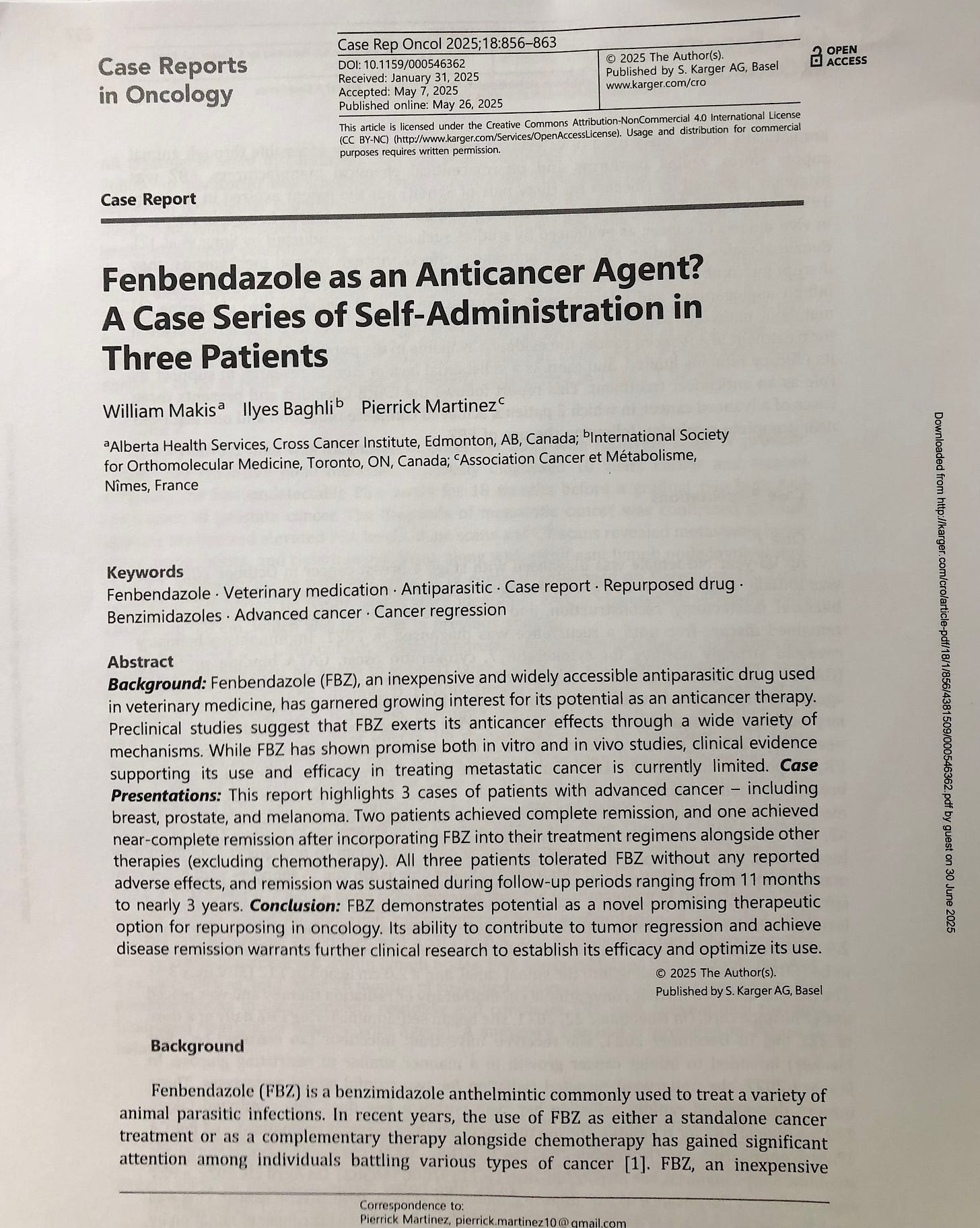New Published Peer-Reviewed Research Paper: Fenbendazole as an Anticancer Agent? A Case Series of Self-Administration in Three Patients
Published in Case Reports in Oncology, May 26, 2025
Fenbendazole Can Cure Cancer presents Case Reports of people who have treated their own cancers along with other articles to help understand how fenbendazole works to treat cancer. Previous articles covering other cancers are in the Archives link.
Three of our Case Reports have been published in a peer-reviewed oncology journal.
Makis, W., Baghli, I., & Martinez, P. (2025). Fenbendazole as an Anticancer Agent? A Case Series of Self-Administration in Three Patients. Case reports in oncology, 18(1), 856–863. https://doi.org/10.1159/000546362
The Case Reports examined correspond to our case reports titled:
Metastatic Breast Cancer, age 83
Prostate Cancer, Stage IV, age 75
BRAF-Positive Malignant Melanoma, age 63, Male
The authors did a great job providing the level of detail on fenbendazole and cancer that can be useful and actionable for clinicians. While you may have read their Case Reports here previously, it may be useful to read the published paper as well for additional details.
The key takeaway from the paper is “This report highlights 3 cases of patients with advanced cancer - including breast, prostate and melanoma. Two patients achieved complete remission, and one achieved near-complete remission after incorporating FBZ into their treatment regimens alongside other therapies (excluding chemotherapy).”
”
Items Included in All Posts
Fenbendazole vs. Mebendazole vs. Albendazole vs. Flubendazole: The benzimidazoles are very similar chemically and they have very similar mechanisms of action with respect to disrupting microtubule function, specifically defined as binding to the colchicine-sensitive site of the beta subunit of helminithic (parasite) tubulin thereby disrupting binding of that beta unit with the alpha unit of tubulin which blocks intracellular transport and glucose absorption (Guerini et al., 2019). If someone asks you how fenbendazole kills the cancer cells, the answer is in italics in the previous sentence.
The class of drugs known as benzimidazoles includes fenbendazole, mebendazole, albendazole and flubendazole. Mebendazole is the form that is approved for human use while fenbendazole is approved for veterinary use. The main difference is the cost. Mebendazole is expensive ~$555 per 100 mg pill, while fenbendazole is inexpensive ~48 cents per 222 mg free powder dose (Williams, 2019). As you may recall, albendazole is the form used to treat intestinal parasites in India and these cost 2 cents per pill. FYI, to illustrate how Americans are screwed by Big Pharma, two pills of mebendazole cost just $4 in the UK, 27 cents per 100 mg pill in India and $555 per 100 mg pill in the US.
While most of the pre-clinical research uses mebendazole, probably because it is the FDA-approved-for-humans form of fenbendazole, virtually all of the self-treating clinical reports involve the use of fenbendazole. Because the pre-clinical cancer studies use mebendazole (ironically the human form of fenbendazole) and humans self-treat their cancers with fenbendazole (the animal form of mebendazole) it is very reasonable to assume that mebendazole and fenbendazole are functional equivalents with respect to cancer. It would be helpful if future pre-clinical and clinical investigations simply used fenbendazole as a practical matter. For the purposes of this Substack, fenbendazole, mebendazole and albendazole are used interchangably.
Where to get fenbendazole
In our experience and the experiences of those that write in, it appears that the three readily available brands of fenbendazole (Panacur-C, FenBen Labs, Happy Healing Labs) are equally effective. Panacur-C can be obtained locally in pet stores, while they all can be obtained from Amazon. The article on Questions & Answers discusses the brands of fenbendazole in detail and shows photos of the various brands referenced.
If you would like to report your experiences with fenbendazole you can do so privately by email myfenbendazole@proton.me or more publicly in the Comments section in any of the articles. Also, if you know of people who’ve tried fenbendazole, and it didn’t work, we’d be especially interested in hearing from you now. Understanding the conditions and factors that enhance or impede the success of fenbendazole in treating cancer are valuable.
Disclaimer:
Statements on this website have not been evaluated by the Food and Drug Administration. The contents of this website is for educational and informational purposes only and is not intended to be a substitute for professional medical advice, diagnosis or treatment. This website does not provide any kind of health or medical advice of any kind. Always seek the advice of your physician or other qualified health provider with any questions you may have regarding a medical condition. The case reports presented reflect the real-life experiences and opinions of other readers or users of the website. The experiences of those readers or users are personal to those particular readers/users and may not necessarily be representative of all readers/users. We do not claim, and you should not assume, that all other readers/users will have the same experiences. Do you own research, consult with relevant medical professionals before attempting to self-treat for any condition.





Fenben worked miracles for my father in law. After less than a year on the protocol, his oncologist determined him “cancer free”…. That was last year, and he’s still going strong! There is absolutely legitimacy to it!
There is a study on substack that shows the effectiveness of menbedizole and fenbendazole on cancers and it showed equivalency and efficacy of the two on most cancers. The exception was brain cancers the fenbendazole was able to pass the blood brain barrier and treat these tumors. Overall efficacy fenbendazole wone over the human drug menbedizole.